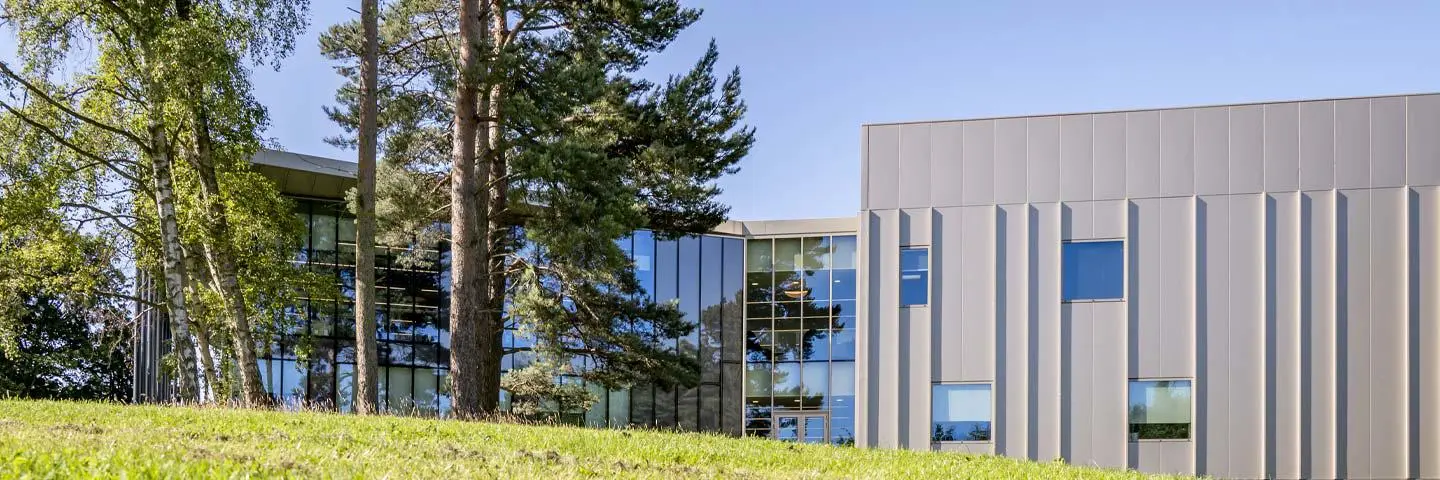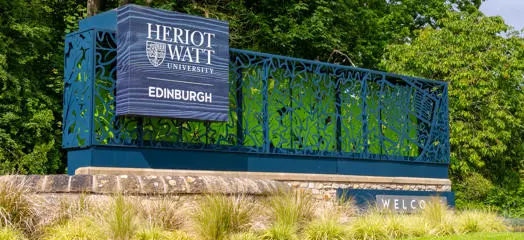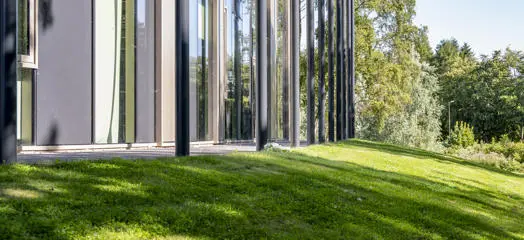Facilities and equipment

Industrial-grade equipment and labs
The School of Engineering and Physical Sciences has a wide range of lab equipment to support teaching and research within our academic disciplines of Bioscience (including Brewing and Distilling), Chemistry, Physics, Chemical Engineering, Mechanical and Aerospace Engineering, and Electrical, Electronic and Computer Engineering.
All engineering and physical science students have access to state-of-the-art laboratories, workshops and specialised equipment including the Makers Lab, Maths Gym, Gaming Lab, VR Suite and computer labs in the GRID building.
Immerse yourself in our facilities
Bioscience
Our Brewing and Distilling students have access to our industry-leading malting, brewing, and distilling labs and facilities. During your studies, you will have access to our on-site nano-brewery (2 HL), distillery, rectification lab, packed full with specialist equipment and software used by industry.
MSc Toxicology students will gain hands-on experience in our state-of-the-art laboratories and workshops, performing cytoxicity (cell death) and genotoxicity (DNA damage) assays, learn about cell culture, and become competent with our light microscopes.
Chemistry
Chemistry students will benefit from and have access to our specialist equipment, software and laboratories used by industry, including our NMR Spectroscopy instruments, single crystal diffractometer, powder (wide-angle scattering) diffractometer, elemental microanalyster, FTIR and melting point determination equipment. Students will have the opportunity to work on research addressing real-world problems, and delivery multi-disciplinary practical solutions that have global impact.
Postgraduate students on the MSc Analytical Sciences for the Biosciences Industries and PhD students will have access to state-of-the-art HPLC systems, IR, UV and NMR spectroscopies, and Mass Spectrometers (both GC-MS and LC-MS). With the help of expert technical staff, students will use the facilities and equipment to its full potential.
Physics
The physics department boasts specialised equipment and labs for research and teaching. Students have access to a range of mechanical, electrical and optical equipment, several of which are computer interfaced, and all of which may use computers for data handling and analysis.
Chemical Engineering
Our Chemical Engineering students are introduced to specialist equipment, software and laboratories used by professional chemical engineers during their time at Heriot-Watt.
Condensation
Fluid condensing on the inside of a pipe can have a visible effect on the efficiency of any heat transfer taking place. Students will study the basics of heat transfer, designing heat exchangers and visualising how heat can flow in differing situations. This condensation rig takes two types of condensation, film-wise and drop-wise, and uses them to develop a deeper understand of the fundamentals of both condensation and heat transfer.
Mock Continuous Stirred Tank Reactor
Knowing what occurs within a chemical reactor is an essential part of Chemical Engineering. Our programmes explore Reaction Engineering, covering different types of reactors and the principles behind them. To build on this knowledge you’ll have the opportunity to use our CSTR equipment, monitoring how a reactor behaves in real time.
Fermentation Broths
Chemical Engineers have a wide range of career opportunities within the food and drinks industry, two industries that readily utilise fermentation as a technique. The importance of gaining an understanding of how fermentation works on a large scale is a vital skill. We put a huge emphasis on learning how to use this equipment, allowing students to apply this equipment to brew their own beer.
Flowmeter Calibration
Fluids, and how they flow, form some of the fundamentals of Chemical Engineering. Knowing the rate of flow can reveal lots of information crucial to the inner workings of a plant. As a result, flowmeters a vital asset to many industries. We prepare students for professional use of flowmeters by teaching them to use our flowmeter calibration kit, curating a lab report on the workings of each type.
Absorption Columns
Absorption is a vital technique to the chemical industry. With the versatility to apply to a number of different processes it has become something the modern world can’t run without. We offer students the opportunity to gain a wide understanding of the fundamentals of absorption columns by carrying out a lab to monitor the flooding point in such a column.
Reactant Distribution
One of the most effective ways to back up theoretical knowledge is to put it into practice. With reactors playing such a key role within the chemical industry, our lab activities put a focus on fully understanding how they operate. In terms of continuous stirred tank reactor, a CSTR, a lot of what happens is down to the distribution of the chemicals inside. Our equipment helps students visualise this distribution, allowing them to take the knowledge into other areas.
Heat Exchangers
Look into any industrial production setup and you’re likely to find a heat exchanger. One of the cornerstones of Chemical Engineering. In stage two a key part of your development as a chemical engineer will be designing these. Designing equipment always goes better when you understand what you’re looking at, that’s why we focus on providing hands-on experience with a heat exchanger.
Distillation
Undergraduate students will analyse the different types of seperation processes used throughour industry. As a part of this course, you pick up a wide range of knowledge about distillation columns, with an understanding of how to design them, both by hand and in industry used software such as ‘Aspen HYSYS’, and ‘ASPEN Plus’. To take it that step further and build your understanding to a industry-ready level, we offer the ability to see a distillation column in action.
Mechanical Engineering
Whilst studying at Heriot-Watt University, Mechanical Engineering students are introduced to specialist equipment, software and laboratories used by professional mechanical engineers. Throughout your studies, you'll have access to our dedicated Mechanical Engineering Workshop, and will receive the necessary support and training to make the most of the equipment to benefit your studies.
Students on our Mechanical Engineering, Aerospace Engineering programmes and those carrying our PhD and postgraduate research will have access to our:
- machining and manufacturing facilities
- air conditioning unit. At the heart of the unit is a thermodynamics cycle called a reverse heat engine, more commonly known as a refrigerator. The unit can therefore be used to demonstrate manipulation of air and also how a refrigerator works;
- Marcet Boilet, allowing students to investigate properties of saturated steam;
- high speed wind tunnel rig, used to investigate the subsonic and supersonic flow regimes and is designed to simulate the flow found in rocket nozzles or in the oil and gas industry;
- wind tunnel for fluid mechanics and aerodynamics;
- uniaxial testing machine for mechanics of materials;
- precision measurements of manufactured or prototyping parts;
- 3D printing facility;
- torsion testing for mechanics of materials.
Electrical, Electronic and Computer Engineering
Robotics and Electrical, Electronic and Computer Engineering students will benefit from and have access to our specialist equipment, software and laboratories used by professional engineers. You'll have the opportunity to work on real-world problems, and work across disciplines to deliver practical solutions with global impact in our state-of-the-art GRID facility.
GRID
GRID will be the hub for projects and lab work, providing you access to innovative labs and facilities for electronics, electrical power, computing, embedded systems, communications, robotics, and mechanical prototyping. This will enable you to undertake a wide range of learning activities and to progressively develop your skills and knowledge throughout.
The specifically designed centre will foster multi-disciplinary working and will provide you with the experience of working in project teams, similar to being in the actual workplace. The facilities are available throughout your studies, allowing you to work on your own projects outside of the classroom - either individually or as part of one of our student societies.

